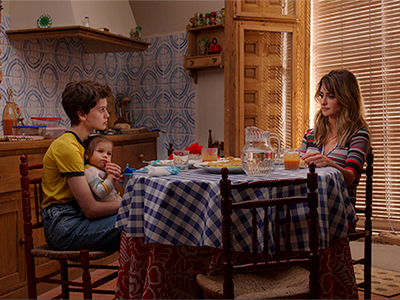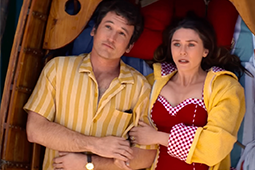
Prepare to be swept up by the bold, primary colour tapestry and emotional insight of Parallel Mothers, the new film from Spain's pre-eminent filmmaker, Pedro Almodovar. The director's signature is all over this moving and powerful story of contrasting motherhood, from its emotional acuity to theatrical visual sense and aching sense of repressed longing.
The movie stars Penelope Cruz, Almodovar's muse with whom he has collaborated on the acclaimed likes of Volver. Following the screening of Parallel Mothers for Cineworld Unlimited audiences (discover the reactions here), the movie is on release in selected Cineworld cinemas from 28th January. If you feel the need to brush up on your Almodovar movies in advance, the following list should help.
1. Women on the Verge of the Nervous Breakdown (1988)
Farce is the order of the day in Almodovar's riotously funny and deliberately kitsch comedy, which explores a series of increasingly warring and hysterical relationships. Absorbing the stagey principles of Spanish 'telenova' soap operas, but in fact adapted from a French theatrical production, the movie's title gets lost in translation. In fact, the Spanish-language nuance doesn't relate to breakdowns, but to hysterical attacks that are often glibly attributed to women. This being Almodovar, he is not out to be sexist or blasé, but instead deeply satirical in his exploration of the battle between the sexes. The film is deliberately meta-textual, invoking Almodovar's love of Hollywood (namely the cult Joan Crawford Western Johnny Guitar) and there's a belting central performance from Carmen Maura.
2. All About My Mother (1999)
The director hit his stride in the late 1990s, delivering a series of impassioned dramas that were deeply personal while also being tied to Spain's tortured political past. In this typically overwrought but incisive story, which won the Oscar for Best Foreign Language Film, a woman grieves the death of her son in a car accident. However, Almodovar mediates the tragedy in his signature, blackly comic, self-referential style, boldly invoking A Streetcar Named Desire while also exploring poignant undercurrents relating to the AIDS crisis and homosexuality. Fashioning humour from heartbreak, a typically heady brew that's bound to leave newcomers enraptured.
3. Talk to Her (2002)
This penetrating drama is one of Almodovar's most disquieting creations. It's the story of two men who bond over the fact that their respective girlfriends are each lying in a coma, which subtly stirs up a hornet's nest surrounding male to female relationships, repressed secrets and much more besides. This being Almodovar, the structure of the drama is much more tricksy and playful than the above description implies, melding different timelines and allowing various perspectives to undercut one another. Melodrama (there is the expected focus on bullfighting) mixes with piercing revelations in this award-winning success, which clinched Almodovar the Oscar for Best Original Screenplay.
4. Bad Education (2004)
The director puts the tormented history of his own country under the microscope in this disturbing account of the legacy of Catholic abuse. Gale Garcia Bernal (The Motorcycle Diaries) stars as film director Enrique who is unexpectedly visited by a man claiming to be his lost lover. This is the catalyst for a journey into the past, as depicted via a film within a film known as 'The Visit', which literalises Enrique's harrowing experiences at a Catholic boarding school. It's one of Almodovar's darkest and most uncomfortable films but, as ever, the visual tapestry of the movie commands awe and attention even while the material strikes shocking notes of discordance.
5. Volver (2006)
The aforementioned Penelope Cruz stuns in this affectionate comedy-drama, which marked a lighter, although no less fascinating, change of pace for the director. He returns to the idea of the quintessential, dysfunctional family clan as Cruz's character, Raimunda, must reconcile with her origins in a dusty, wind-swept area of Spain, located just outside Madrid. The movie's blend of social realism and intentional fantasy and high comedy, as evidenced by the presence of Raimunda's undead mother, belies its tender insight into the nature of family relationships. Cruz was Oscar-nominated for her role in the movie, becoming the first-ever Spanish woman to receive such recognition.
6. The Skin I Live In (2011)
It was back to overwrought Hitchcockian thrills in this ghoulish and gory Almodovar offering, which balances gender fluidity and body horror with a host of twists. Almodovar takes his primary inspiration from the cult French chiller Eyes Without a Face, casting his former muse Antonio Banderas as a surgeon who has a masked woman locked within his mansion. The director's typically slippery use of chronology, melded with the unpredictable mixture of laughs and shocks, keeps us guessing as to the motivations, and, indeed, orientations, of every character involved. What makes us who we are: the skin or the soul? Almodovar isn't about to provide easy answers in this mercurial thriller.
7. Julieta (2016)
A woman must reckon with her past tragedies in this sweeping and affecting Almodovar drama. It's perhaps a tad more accessible than many of Almodovar's more tricksy dramas, although no less insightful for that, casting two different women as two halves of the same character. The story unfolds as a journal penned by the eponymous Julieta, as she unspools her early life and the birth of her daughter, Antia, from whom she has become tragically estranged. In terms of embodying the older and younger Julieta, actors Emma Suarez and Adriana Ugarte do a masterful job, youthful naivete contrasting with the melancholic regret of middle age, which communicates the film's central message of life's rich tapestry.
8. Pain and Glory (2019)
Antonio Banderas reunites with Almodovar and gives a career-best performance as an ageing film director in this sumptuous blend of fantasy and reality. As ever in this director's films, the past isn't buried, but remains an active, penetrating entity, and nostalgic memories can be prompted by even the most banal, commonplace situations. When Banderas' character Salvador discovers one of his films has been restored, it prompts an important reunion and a sustained period of reflection as he weighs up his career success with the mistakes he's made in his life. One might imagine that Almodovar, in his advancing years, is using Salvador as his on-screen surrogate, but nothing is spelled out that glibly.
Parallel Mothers is released in selected Cineworld cinemas on 28th January. What is your favourite Pedro Almodovar movie? Let us know @Cineworld.












.jpg)
.png)






